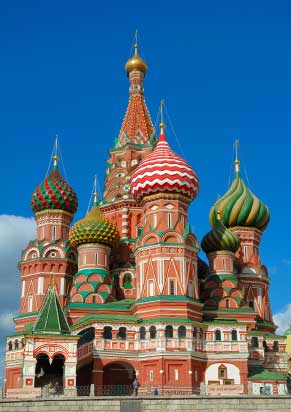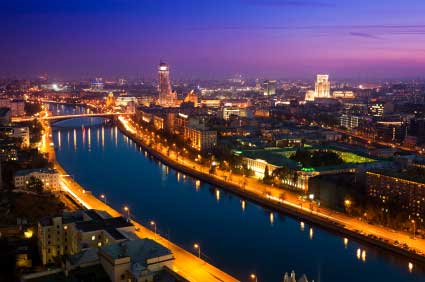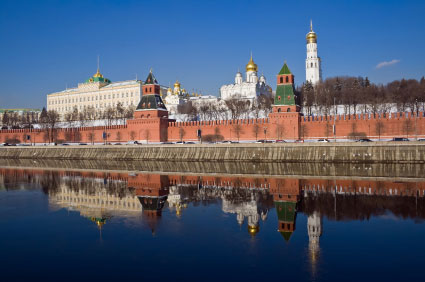Moscow is a vibrant and bustling place to live and work. If you’re planning to move abroad and start anew then it isn’t a bad choice for the discerning expat.
A city storied in history, Moscow is full of stunning sights and architecture and there are a number of wonderfully tranquil neighbourhoods, filled with friendly locals and well kept parks. Since the demise of the communist empire Moscow has embraced the flashy side of capitalism and littered the shopping districts with well known western stores and luxurious designer boutiques. The streets of Moscow that were once bleak and desolate are now busy with life and energy, there are many market traders and street vendors selling a host of different wares. One of the downsides of moving to Moscow is that it has the dubious honour of being one of the most expensive cities in the world.
The weather in Russia is often described as iconic. The classically cold harsh winters eventually make way for a warmer summer season, there is little rain in Moscow but there is much snow, often starting around October and lasting all the way to spring. Another seasonal factor worth considering is the lack of daylight that Moscow receives in winter, some days only six hours are recorded.

Employment, Work Permits and Visas
Becoming an expat in Moscow is not without its difficulties as immigration laws are becoming tougher and tougher. You must apply for a visa and work permit before you reach Russian shores as it is extremely difficult to obtain these documents if you travel to Russia without them.
However, recent changes to the strict immigration laws have made life a little easier for foreign workers who are highly skilled. From 1 July 2010 highly qualified foreign professionals will be able to apply for special three year work permits. To qualify for this longer permit you must have key skills in a specialist field, and gain a contract of employment worth £43,000 per year or more.
It is not advisable to travel to Moscow with the intention of securing work once you get there. The majority of expats who journey to Russia have secured employment; or are sent there through their existing employers, as it is very hard for foreigners to source work once in Russia. In fact Russia actually has a yearly quota of work permits that can be given out via the Federal Migration Services. However, there is a large amount of corruption and patronage and these permits are often given out previous to the year in question.
If you work in construction or oil you may be able to gain special expat packages enabling you to work in Russia. The types of sector where expats are likely to be able to gain employment are management, engineering, IT and banking. A problem that arises for foreigners seeking employment in Russia is the fact that home-grown, English speaking Russians, will generally work for less than their expat counterparts. If you have been offered a job in Moscow then your prospective employer will most likely have applied for the permit on your behalf. Contact the Federal Migration Service for more information.
Business Culture
If you start working in Moscow you will notice that Russian business practices are very similar in essence to the western sensibilities you are already used to. Russian business folk are direct and do not put an emphasis on establishing personal relationships. Dress code is generally smart and you can make a good impression on new associates by delivering a good firm handshake and making strong eye contact. When ordering business cards it would be wise to have two sides printed, one in Russian and one in English.
Accommodation
Expats moving to Moscow may face potential difficulty finding somewhere to live. Rental prices in Moscow can be very expensive and lower priced apartments located in the industrial areas are hot commodities due to their cheaper rents. However, these cheaper apartments tend to be basic with often just one room. Many expats will find that it can take up to one month to find accommodation so you may wish to opt for one of the short term apartments that are on offer, which tend to charge by the night. If you are interested in purchasing a property in Moscow then once again you will find that prices are very high. There is a strong expat community in Moscow and many of these expats tend to flock towards the same areas, areas such as Patriarshiye Ponds and Chistye Prudy are both popular.
Transport
If you already hold a valid driving licence in your home country then upon relocating to Moscow you will be able to use this existing licence for a total of six months, however you will also need to submit a translated version of your licence, a valid medical certificate that cites good health and that you have no history of substance abuse or mental illness and also your passport. After submitting these documents you will have to take a driving exam, which is completely in Russian and does not allow the use of a translator. The test is made up of 20 questions that are pulled from a bank of 300 stock questions.
If this all sounds a bit daunting then take solace in the fact that the Moscow metro system is one of the most efficient and best transport systems in the world. Lavishly decorated with sculptures and mosaic art, 150 stations make up the metro network and not only is it fast and reliable, but it is also cheap. The metro runs until 1am.
There are also numerous buses and trams to help cart you around Moscow along with special passenger vans (essentially private buses) that actually follow bus routes. Independent, or private, taxis are also found on Moscow’s roads but be aware that as a foreigner you will most likely be charged a higher fare and, whilst mostly safe, these private cars may also be dangerous come nightfall, especially for women.

Healthcare
Healthcare can come with a hefty price tag and sometimes medical insurance will not be accepted. If you require emergency care then be aware that a lack of funding means that there are often delays to the service, also it is uncommon for the emergency telephone operators to speak any language other than Russian so be prepared for this potential barrier. A silver lining in this potentially lethal raincloud is the fact that there are a few international hospitals that do actually cater to foreigners living in Russia. Two examples of these are the American Medical Centre, and the European Medical Group. These facilities both have staff that are predominantly educated at western institutions and they will be able to speak in a variety of different languages, English included, to ensure there are no problems in describing your symptoms. Both of these facilities also have a wide range of medical services available, more so than the standard Russian hospitals.
Education
The authorities of Moscow, indeed the whole of Russia, hold the importance of education in high regard and for this reason you will find that there are many schools to be found in Moscow. There are numerous English-language schools and also specific international schools. Some schools also offer more specialist teaching, focusing perhaps on just math, or foreign languages. Russian children partake in a compulsory eleven year programme of secondary education.
As per most popular expat destinations, there are a number of schools that actually stick to the English National Curriculum. An example of this is the English International School; which has been operating for over 12 years, and the British International School.
As a UK expat you may not be well versed in the Russian language itself, so if you are thinking about learning Russian you may be interested in attending the language school at the Lomonosov Moscow State University, a popular choice for working expats. Here they offer intensive courses aimed at people who are completely new to Russian, focusing on important phrases and terms that will help you in your day-to-day life.
Entertainment and Lifestyle
Moscow is a truly beautiful city with a phenomenal amount of culture and history. When you first arrive in Moscow it may be worth your while to embark on one of the many city tours so that you can get an idea of the feel of the city, its attractions and prime locations. A city tour will not only show you around Moscow but also gives you a veritable history lesson and fills you in on all the social and economic factors that have helped build your new place of residence into the cosmopolitan hub that it is today.

Given its unique history it is no surprise that Moscow plays host to a wealth of wonderful museums. The Pushkin Museum is home to the second largest collection of fine European art in the world, showcasing the works of such artistic luminaries as Vincent Van Gogh, Matisse and Renoir.
As touched upon before, Russia is a very expensive place for expats to live, but a benefit is the comfort of western sensibilities, which means all the big brands you are used to will have stores in Moscow to cater for your shopping needs. There are also many market places where you can sample a slightly more authentic Russian shopping experience.
Moscow is a city that provides a wide variety of entertainment during both the day and night. There are a huge amount of swanky bars and lively nightclubs waiting for you to step past their bouncers and relax after a hard week’s work with the aid of some authentic Russian vodka.
The Russian embassy in the UK can be found here: http://www.rusemblon.org/

